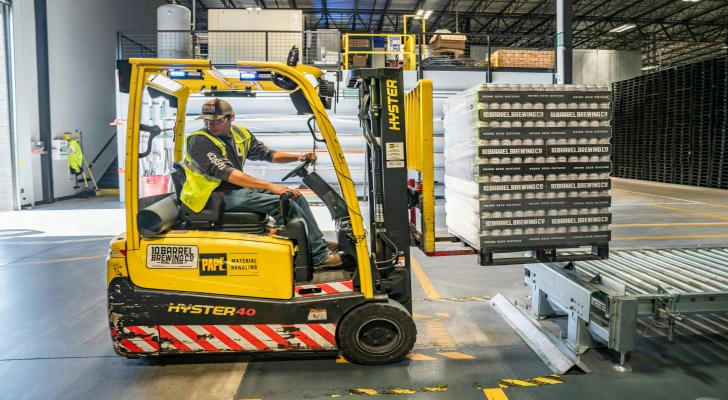The Machinery Masters, How to Land a High-Paying Job Operating Heavy Equipment

Heavy machinery operators play a vital role in various industries, from construction to logistics. These professionals require specialized skills, training, and experience to operate complex machines safely and efficiently. In this post, we'll delve into the world of heavy machinery operators, exploring the different professions,their work environments, job content, benefits, and potential risks and drawbacks. their requirements, and what it takes to succeed in these roles.
Work Environment:
Heavy machinery operators work in a variety of environments, including construction sites, quarries, mines, warehouses, and distribution centers. They often work in fast-paced, physically demanding environments with heavy machinery and moving vehicles.
Job Content
Heavy machinery operators are responsible for operating complex machines to move materials, goods, and equipment. They work independently or in teams, communicating with other operators and site managers to ensure efficient operations. Their duties may include:
- Operating heavy machinery, such as loaders, forklifts, trucks, excavators, and bulldozers
- Moving materials, goods, and equipment around construction sites, warehouses, and distribution centers
- Ensuring timely deliveries and meeting production targets
- Conducting routine maintenance and repairs on machinery
Benefits
Heavy machinery operators can expect a range of benefits, including:
- Competitive salaries, ranging from $30,000 to $85,000 per year
- Health insurance and retirement plans
- Paid time off and holidays
- Opportunities for career advancement and professional development
Qualifications and Legal Regulations:
To become a heavy machinery operator, individuals typically need to meet the following qualifications:
- High school diploma or equivalent
- Completion of a heavy machinery operator training program
- Valid driver's license and clean driving record
- Pass a drug test and background check
- Meet physical requirements, such as good vision and hearing, and the ability to lift heavy objects
As a driver in this industry, you will encounter various types of faults and hazards, requiring a clear mindset and adherence to safety rules and correct handling procedures. This broadly includes several aspects:
Potential Risks and Drawbacks
Heavy machinery operators may face physical demands, such as lifting and bending, and work in hazardous environments with heavy machinery and moving vehicles. They may also experience:
- Physical strain and fatigue from long hours of operation
- Exposure to harsh weather conditions and noise pollution
- Risk of accidents and injuries from machinery malfunctions or human error
- Load instability or falling objects
- Pedestrian or vehicle traffic
- Poor visibility or blind spots
- Unstable ground or terrain
- Adverse weather conditions
- Operator fatigue
Challenges and Safety Essentials
- Regular equipment maintenance and inspection
- Proper loading and unloading procedures
- Effective communication with pedestrians and vehicles
- Personal protective equipment (PPE) and safety gear
- Advanced safety features, such as cameras and sensors
- Thorough site surveys and hazard assessments
- Weather protocols and regular breaks
- Secure cargo loading and transportation
- Equipment failure or malfunction
- Cargo shifting or falling objects

Heavy machinery operator training programs can be obtained through vocational schools, community colleges, or private training centers. These programs typically include classroom instruction and hands-on training, covering topics such as safety procedures, equipment operation, and maintenance.
In addition to these qualifications, heavy machinery operators must adhere to legal regulations:
- OSHA regulations for workplace safety
- DOT regulations for commercial drivers
- State and local regulations for heavy machinery operation
By meeting these qualifications and adhering to legal regulations, heavy machinery operators can ensure a safe and productive work environment, while also advancing their careers and earning competitive salaries. Technical Requirements and Market Demand
Heavy machinery operators require a range of technical skills:
- Proficiency in operating complex machinery, such as hydraulic systems and computerized controls
- Knowledge of safety procedures and regulations
- Ability to perform routine maintenance and repairs on machinery
- Strong communication and teamwork skills
The market demand for heavy machinery operators is high, driven by:
- Increased infrastructure development and construction projects
- Growing demand for goods and services in e-commerce and logistics
- Need for efficient and safe material handling in warehouses and distribution centers
According to the Bureau of Labor Statistics, employment of heavy machinery operators is projected to grow 5% from 2020 to 2030, faster than the average for all occupations. With an estimated 44,000 new job openings per year, heavy machinery operators can expect a strong job market and competitive salaries.By possessing the necessary technical skills and meeting the qualifications and legal regulations, heavy machinery operators can capitalize on the growing demand for their services and enjoy a rewarding and lucrative career.
Here are some specific examples of heavy machinery operators, including forklift operators, excavator operators, and truck drivers, along with their typical benefits, work environments, common faults and hazards, and how they handle them:
Forklift Operator( Mr. Monick)
- Typical benefits:
- Competitive salary: $65,000 per year
- Work environment:
- Warehouses, distribution centers, and manufacturing facilities
- Fast-paced and physically demanding environment
- May work in a team or independently
Truck Driver( Mr. dunlop)
- Typical benefits:
- Competitive salary: 75,000 per year
- Work environment:
- On the road, driving long distances
- Physically demanding environment with long hours of driving
- May work independently or in a team
